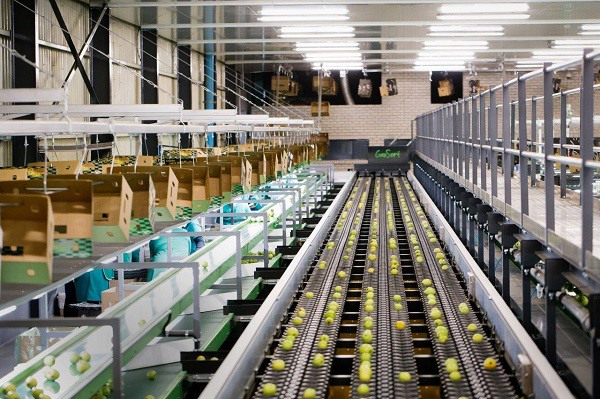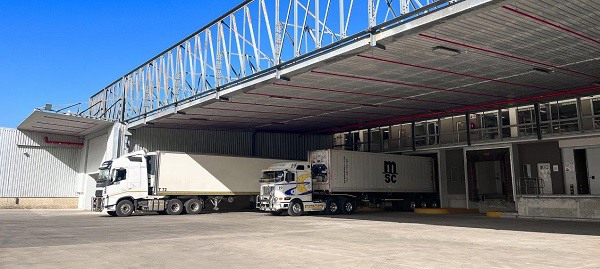“When I started in 2005, as soon as Royal Gala was harvested, by week 6 or week 7, you’d start loading for the UK. Over the intervening years the UK started ordering on average ten weeks later but this year, for the first time in many years, I’m seeing that requests from the UK for Royal Gala are already starting now,” says Roux Groenewald, managing director of Betko, a family-owned fruit marketer, packer and grower (in that order, he notes) in Villiersdorp.

He ascribes the early interest in Royal Gala to the impact of the heatwaves and high refrigeration costs in Europe on domestic Gala supplies. He won’t, though, necessarily send Royal Gala this early to the UK because the UK has been struggling to keep up with the prices that early South African apples can obtain elsewhere in the world.
"Timing is an important factor. I believe that during the late season, the UK / EU market will be able to match the prices of early season fruit in Asian markets."
High energy prices will surely have an impact on fruit sales in Europe this season, he believes, and might be beneficial for a workaday category like apples but there is so much competition among fruit that it’s no guarantee.
“We sense that Southern Hemisphere exports are decreasing because of the longer availability of CA stocks in the Northern Hemisphere. I have been talking to some of my bigger receivers in Europe and the UK, I’ve told them it is not something we want to do. The EU and the UK are South Africa’s traditional markets. That’s easy business, you set your programmes before the season starts, you keep to the programme, you get your money.”
He says: “Now for the South African pome fruit industry to go more and more to the East is much more difficult. I need to stress that it’s not something we want to do, it’s something we sometimes have to do. Margins in our industry are so small you have to maximise your returns wherever possible.”
Adapting to Asian business models
“For the last few years we are trying to adapt more to doing retail business in other markets. There’s always a bit of a bleeding period when you enter new markets. The business models are different, there is slightly more risk attached to those markets. We’re now in that period with India and China but it’ll sort itself out, I believe. The opportunities are there.”
“What we really need is worldwide economic growth. We need more people coming from poverty into the middleclass every year. It’s either that or the world pome industry needs to pull back supply.”
For the last three or four years, Turkey and Poland have posed greater competition on apples in Southeast Asia. He puts forth that it is through service and commitment to their clients’ needs that a company remains competitive.
“The spec is the spec, the price is the price, but what distinguishes suppliers is service: bending over to meet customers’ expectations, offering flexibility in terms of packaging, delivering on time and to the customer’s doorstep.”
Own production for security
From its inception by Roux’s late father Japie Groenewald as a pomefruit marketer in since the 1980s, during the period when South Africa moved from state-controlled agricultural marketing to a free trade system, Betko has invested in packing and cold storage facilities.
Since 1992 they’ve been establishing their own orchards, today totaling 680ha, but Betko’s own volumes are capped at around 70% because they have no wish to be competition to the smaller growers for whom they also pack.
“Our offering consists of 70% apples and 30% pears. We process around 110,000 bins in a season of which 65% is from our own farms and the balance from other farms in the area.”
Sometimes customers might request grapes, for instance, which they’ll then buy in and co-load with the apples or pears.
“From a positioning perspective, we are at a point where we wouldn’t want to expand too much further. A quarter of our trees are not bearing yet. In 5 years, those young trees will come into full production. That’s the positioning that we are after.”
Betko’s packing facility is set up for maximum 55,000 tonnes and they’re now at 42,000 tonnes.
“These days with costs like they are, you have to try utilise your facility to the maximum. On the other hand, having some extra capacity can also be helpful. You don’t need to pack something if you don’t have to, when prices for a product is very low. You can play the market with timing somewhat.”
Impact of South Africa's electricity crisis
Electricity supply is still a big challenge. “Last year we used 110,000 litres of diesel for our three generators. The cost of this is more than three times it would have been without generating electricity ourselves."
He continues: "It just eats away at the little margins we already have. It remains to be seen how the South African government is going to handle this, but we’re not seeing any ‘light’ in the tunnel for now."
Roux remarks that while they have concluded a renewable water project last year and are in the planning process of a solar project planned to be up and running by the end of this year, solar or wind power is not cost-effective enough to power refrigeration plants.
"What we need is a sustainable power grid to keep on providing people with sustainable incomes.”
“Royal Gala is a beautiful apple to work with”
Betko grows and packs mostly older varieties like Granny Smith, Golden Delicious, Packham’s and Royal Gala.
“We’ve always been a bit top-heavy on Goldens and Packham’s Triumph, which are low-income per kg varieties these days, although that is changing with new orchards. We haven’t planted new Goldens for years, but there are still a lot of Golden orchards around.”
New orchards include club cultivars, and some seem interesting, but Roux regards them with reservation. “Some club varieties work in the marketplace but if you look at some of them, they are difficult to grow and manage post-harvest. There are some very good new ones, but the old varieties are a safer bet if you have sufficient tonnage per hectare, something that can also be stored for longer periods. It doesn’t really work with these newer cultivars.”
New striped Gala strains have been performing well in their area. “The new clones colour well and have a very high exportable pack-out. We store some Gala strains for a local retailer into October, and it’s still a good, crunchy product.”
It’s a beautiful apple to work with, he adds.
Unpredictability of fruit trade
Being a fruit trader is as close as one can get to being a trader on the stockmarket floor, Roux says.
Last year presented a once in a fifteen- or twenty-years’ opportunity for pears in Europe due to the low stock-levels and the industry was expecting an excellent season for South African pears in Europe – until the war intervened very early in the season, and the pear season turned out to be just an average one.
The opposite can fortunately also happen. “In 2020, with the outbreak of COVID-19, we were wondering what we were going to do with all this Golden Delicious, for instance – and we ended up shipping high retail volumes across Eastern Europe and Asia.”
Reduced exports of marginal counts
Shipping costs are coming down slowly. The impact of freight rates was nicely demonstrated last year, he remarks: “For 2022 South Africa’s freight increases were less than New Zealand’s or Chile’s, which created a competitive advantage in the Middle East for South Africa."
However, this year they do not see that happening. He continues: “Before the rise in logistics costs, there was always some export market for class 2 or marginal, low colour product. Now, because of shipping costs, that marginal product stays in South Africa and the market have become a bit more oversupplied.”
Betko spreads its risk and opportunities by exporting to around forty countries because, he notes, you never can tell how a season is going to turn out.
"We should be talking more"
“We need to work on price-points. You can absorb your higher input costs from there, but prices are the starting point. Our industry produces high quality apples and pears. I do not see the need for it to be sold at lower prices than it has to. As an industry, we should be talking more, I believe, like we did in the past,” Roux remarks. “There’s a big difference between colluding and talking.” For more information:
For more information:
Roux Groenewald
Betko Fresh Produce
Phone: +27 28 840 8105
Email: [email protected]










